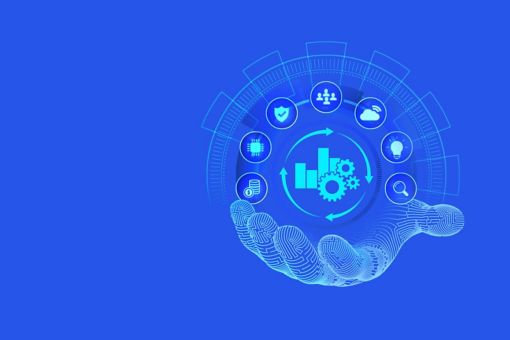Our DX Coffee Chats offer a strong dose of insight—just what you need to fuel your organization's digital transformation (DX). In this series, we sit down with business leaders from across Canada to discuss their perspectives and experiences driving business value and growth through strategic and secured digital technology investments that deliver leading customer experiences.
Grab yourself a cup of joe and join us as we explore how organizations break down silos to become more digitally connected across front, middle and back offices, and how they use software-as-a-service (SaaS) and disruptive technologies to build trust among their stakeholders.
Explore past episodes in the series
What did we chat about?
Moving from AI pilot projects to performance gains
This webinar explored how organizations can close the gap between AI adoption and real business impact. Technology, HR, and change management leaders shared their candid perspectives on:
- How to tailor AI training for front-line staff and senior leaders
- How to identify high-impact AI use cases for workflow redesign
- Steps to build a culture of continuous learning and innovation
- Ways CIOs and CHROs can align strategies to drive lasting results
Guests:
- Brad Strom, Chief Information Officer – York University
- Tina Robinet, Senior Vice President, HR Shared Services – TD Bank Group
- Megan Jones, Partner, People & Change Practice – KPMG in Canada
Host:
- Lewis Curley, Partner, People & Change Practice – KPMG in Canada
What did we chat about?
Strategies for transformation ROI
In this DX Coffee Chat we reflected on a real-life transformation story, using it as a framework to explore practical strategies to secure ROI and avoid common pitfalls in technology implementations for the finance function. Designed for finance, technology, and operations executives, responsible for leading or influencing finance transformation projects, this actionable discussion provided listeners with the necessary tools to lead effectively, foster collaboration between finance and technology, and ultimately, drive value for their organization.
Guests:
- Kari Hess, Vice President, Finance Shared Services & Technology, Element Fleet Management
- Andrea Kiss, Head of Partner Alliance Success, SAP
- Chris Moore, Partner, National Leader, Finance Transformation, KPMG Canada
Host:
- Vinod Kumar Neelamegam, Partner, National Leader, SAP, KPMG Canada
What did we chat about?
Outsmarting fraud in a digital world
We explored the most critical fraud risks affecting today's business landscape and discovered strategies and leading practices to fortify defenses against digital fraud. Marilyn, Vivek and Amrit discussed the importance of remaining vigilant, assessing the potential impact of fraud on organizational operations, financial health, and reputation and staying on top of evolving threats. Elad, head of Fraud products at Chainalysis and Jaimin discussed the evolving fraud landscape with a focus on practical actions around critical topics such as fraud scams, the implications of deepfake technology, and the unique risks associated with cryptocurrency in a fireside chat.
Guest
- Elad Fouks, Head of Fraud Products, Chainalysis
- Marilyn Abate, Partner, Risk Services, Forensic & Financial Crimes, KPMG in Canada
- Vivek Jassal, Partner, Cybersecurity, KPMG in Canada
- Amrit Dev, Senior Manager, Forensic, KPMG in Canada
- Jaimin Patel, Senior Manager, Financial Crimes Risk Services, KPMG in Canada
Host
- Nancy Chase, Partner, National and Global Service Line Leader for Risk Services, KPMG in Canada
What did we chat about?
Navigating identity unification in mergers and acquisitions
We explored the challenges and solutions for maintaining centralized visibility in Identity Access Management (IAM) and control across hybrid environments during mergers and acquisitions (M&A). Thomas and Melissa discussed strategies to seamlessly incorporate cloud-based identity into existing enterprise architectures, emphasized the significance of identity unification during M&A processes, and provided practical advice on avoiding common pitfalls when dealing with legacy and cloud systems.
Guest
- Melissa Carvalho, Vice President, Global Security Identity and Access Management (IAM), Royal Bank of Canada
Host
- Thomas Davies, National Cyber Transformation and Risk Managed Services Leader, KPMG in Canada
What did we chat about?
Beyond AI: Strategies for CIOs to navigate the tech frontier
In this DX Coffee Chat we explored actionable strategies that CIOs can implement to maximize their technology investments, based on findings of the KPMG 2024 Global Tech Survey. This insightful session featured a rapid-fire Q&A with subject matter specialists and a fireside chat with our esteemed guest speaker, who shared practical experiences in complex transformations.
Guests
- Dr Justin Cross, Chief Digital Health Officer, Integrated Health and Social Services University Network (CIUSSS), West-Central Montreal
- Kathy Penner, Partner and National Leader, Technology Enterprise Solutions, KPMG in Canada
- Ven Adamov, Partner and National Leader, Data & Analytics Risk Services, KPMG in Canada
- Hartaj Nijjar, Partner and National Leader, Cybersecurity, KPMG in Canada
Host
- Sanjay Pathak, Partner and National Leader, Technology Strategy and Digital Transformation Services, KPMG in Canada
What did we chat about?
Workforce AI: Empowering your people to drive AI value
Leaders in Human Resources and Digital transformation stand at the forefront of one of the most significant shifts to impact the future of work – the adoption of generative AI. The opportunities to accelerate business value and impact with AI are vast, but only if leaders put their people at the core of this transformation.
By fostering a culture of growth, emphasizing net value creation, and being intentional about AI deployment, organizations can maximize the benefits of an AI-empowered workforce. In this DX Coffee Chat, our panel of People and Change specialists shared their perspectives and practical insights on how AI is transforming the way we think about work and how to capitalize on the value AI promises by focusing on new organizational and workforce models.
Guests
- Helen Davies, Senior Vice President of Talent, TD Bank Group
- Megan Jones, Director of People and Change practice, KPMG in Canada
Host
- Lewis Curley, Partner in People and Change practice, KPMG in Canada
What did we chat about?
The CFO and AI: Shaping the Future of Finance
Finance leaders have a unique opportunity to use AI to elevate the finance function, while also playing a critical role in linking AI strategy across the business with investments and enterprise performance. How do you navigate the challenges and opportunities of this evolving technology? How do you measure and weigh the cost, the benefit, and the risk? And how do you convey the value to your stakeholders? In this DX Coffee Chat to our panel of AI and finance specialists addressed top of mind questions that every CFO should consider in relation to AI and generative AI.
Guests
- Steve Suarez, CEO, HorizonX
- Aris Kossoras, Global Finance Function Benchmarking Lead for Banking, KPMG
Host
- Stephanie Terrill, Canadian Managing Partner, Digital and Transformation and National Leader, Management Consulting, KPMG in Canada
What did we chat about?
From start to scale: Unlocking generative AI's potential
As generative AI reshapes the landscape of innovation and productivity, the question is no longer "if" but "when" it will transform the workplace. In Canada, an overwhelming majority of organizations are already reporting a significant boost in work quality thanks to generative AI. Yet, many organizations are still unsure where to start, how to scale a use case, or how to proactively manage the risks. Are you ready to safely unlock its potential to drive business value? In this DX Coffee Chat we explored how to enhance business value with a robust, trustworthy, people-centric AI strategy.
Guests
- Nantes Kirsten, Director, Financial Analytics & AI CoE, Bell
- Chitra, Head of Services for GTA Lighthouse, KPMG in Canada
- Marc Low, Director, Innovation, Growth and Emerging Tech, KPMG Ignition
Host
- Kareem Sadek, Partner, Emerging Tech Risk Leader, KPMG in Canada
What did we chat about?
Global tech survey 2023
As generative AI reshapes the landscape of innovation and productivity, the question is no longer "if" but "when" it will transform the workplace. In Canada, an overwhelming majority of organizations are already reporting a significant boost in work quality thanks to generative AI. Yet, many organizations are still unsure where to start, how to scale a use case, or how to proactively manage the risks. Are you ready to safely unlock its potential to drive business value? In this DX Coffee Chat we explored how to enhance business value with a robust, trustworthy, people-centric AI strategy.
Guests
- Hartaj Nijjar, National Cybersecurity Practice Lead, KPMG in Canada
- Kathy Penner, National Technology Enterprise Solutions Group Lead, KPMG in Canada
- Sanjay Pathak, Technology Strategy and Digital Transformation Practice Lead, KPMG in Canada
Host
- Anna Leon, Partner, Technology Strategy and Digital Transformation, KPMG in Canada
What did we chat about?
Security in the age of access
Welcome to the age of access – where the adoption of digital technologies generates both points of connection and points of vulnerability. In this world of emerging technologies, evolving legislation, and ever-increasing connectivity, strong cybersecurity and privacy are the cornerstones of success. On their journeys towards security, Canadian businesses face navigating a rapidly changing landscape that continues to increase in complexity.
To keep organizations safe and maintain the trust of key stakeholders, a comprehensive approach is required that includes investing in advanced security technologies, fostering a culture of cybersecurity awareness, and ensuring compliance with relevant legislation. In this DX Coffee Chat our esteemed speakers addressed these and many other cyber and privacy topics.
Guests
- Andrea Stapley, Chief Information Security Officer, OANDA
- Ireen Birungi, Vice President of Information Security & CISO, Interac Corp.
- Alexander Rau, Partner, Cyber Security, KPMG in Canada
Host
Kareem Sadek, Partner, Risk Consulting, Crypto assets & Blockchain Services Co-leader, KPMG in Canada
Key takeaways
Here are some key takeaways from our DX Coffee Chat on key trends in cybersecurity, privacy, and emerging technologies:
Talent shortages and burnout create new risks
The pandemic changed the way we work, accelerating digital transformation and shifting organizations toward permanent remote or hybrid workforces—which has created new security risks. But there’s another factor at play. Starting with the Great Resignation and now with Quiet Quitting, there’s a shortage of talent in the workforce – and those who’ve stayed may be feeling the pressure. This should be a notable concern for leaders. “Employees are feeling overworked and burned-out,” said Ireen Birungi, VP of Information Security and CISO at Interac Corp.
That means they’re more susceptible to making mistakes or becoming a victim of phishing campaigns. “As we start to digitize our data, these distractions are real and can lead to these scenarios,” said Birungi, adding that it’s the job of the CISO to create an ecosystem of protection, including detection, protection, response, and recovery, as well as build a culture of security awareness. Technology leaders can also turn to automation to address staff shortages and repair skills gaps, according to KPMG’s 2022 cyber report.
New technologies require an agile approach
When OANDA started working with agile development processes, they quickly realized that security would be a roadblock. “You can’t spend two months doing a security assessment on a third party. You need to do it in a couple of hours. So that was a big shift in how we work together,” said Andrea Stapley, CISO of OANDA.
Taking advantage of new technologies and lean processes—and do it securely—required a shift in thinking. For OANDA, that meant a shift from on-prem expertise to relying on partners, as they built out a Cloud Centre of Excellence. But they took it a step further and teamed their top people with vendor partners to reskill and upskill them. “We saw a shift in having to rely on our vendor partners and not pretend that we’re the experts,” said Stapley. “We really needed our partners in that transformation journey, and that was a key part of our success.”
Regulatory guidance is evolving and leaders need to adapt quickly
Standards have been quickly evolving since the EU launched General Data Protection Regulation (GDPR) compliance in 2018 to modernize laws that protect personal information. This has inspired governments around the world to enact similar higher standards. “The Canadian government wants to compete on the world stage to be better data innovators, but you can’t really do that with rules that aren’t fit for purpose. So, there’s a huge modernization effort here in Canada,” said Sylvia Kingsmill, Global Cyber Privacy Leader with KPMG in Canada.
Québec was the first Canadian jurisdiction to table Bill 64, now called the Privacy Legislation Modernization Act (Law 25), which has brought about sweeping changes “because the law actually has teeth,” she said. But more is coming with respect to emerging technologies such as AI, biometrics, and digital identities—and it’s an area where organizations will want to stay abreast of regulatory guidance from leading entities such as the European Data Protection Board and take proactive measures.
There’s no silver bullet
KPMG’s CEO Outlook revealed that two-thirds of Canadian business leaders intend to rapidly drive digital transformation to stay competitive. But doing this securely comes back to basics: building robust processes. During the pandemic, most organizations were forced to accelerate their transformation plans, which also provided them with a higher degree of risk protection as opposed to older, legacy processes.
“Technology is moving very fast. But if we have the right processes in place, we can buy ourselves the time to put the right policies, procedures, and resources in place,” said Alexander Rau, Partner in KPMG in Canada’s Advisory Services for Cyber Security. But organizations don’t have to do the heavy lifting themselves—nor should they. Not every CISO is an expert in AI or quantum computing, so reaching out to subject matter experts in those fields can help them be better prepared for these new paradigm shifts.
What did we chat about?
Pressing forward on digital in the midst of complexity
Accelerating the digital agenda is a significant challenge for any organization. Now, imagine the challenges faced by an organization who caters to every person living or visiting our country – addressing their ever-changing expectations and the reality of a digital divide. Not to mention, an organization that operates in various industries, including financial services, transportation and logistics, to healthcare, energy and education.
Driving the pace of digital transformation in this complex environment requires far more than changing business processes and deploying technology, it demands changing the language of the transformation itself. In this DX Coffee Chat we had a must-see conversation with Catherine Luelo, Chief Information Officer for the Government of Canada about digital transformation in the public sector.
Guest
- Catherine Luelo, Chief Information Officer, Government of Canada.
Host
- Anna Leon, Partner, Technology Strategy and Digital Transformation, KPMG in Canada
Key takeaways
Here are some key takeaways from our DX Coffee Chat on how a sprawling, complex organization is accelerating digital transformation:
Embedding a shared vision for digital across your organization and its culture
Technology is rapidly evolving—but it’s important to consider how this evolution will affect people and processes. One of the most difficult parts of any transformational project is change management.
“As we’re looking at some of these large, transformational programs within government, it’s important to make sure we’re supporting the departments that are delivering modernization—that we are challenging them to not only get the technology right but to make sure that our hard-working public servants and Canadians are equipped to receive it,” said Luelo. Any complex organization should consider people and processes, not just technology, on their DX journey.
Boosting talent development to enable digital transformation
“Government delivers technology that supports all Canadians with some of our programs supporting those who are most vulnerable,” said Luelo. “We get to do all of this really, inspiring, meaningful, purpose-driven work.” But Canada has a talent gap. The vacancy rate in government in the Digital space is high, but many private sector organizations—from banking to transportation—are in a similar situation.
“I think we would all benefit in the country if we had a more active exchange of talent between private sector and public sector,” said Luelo. “There are many things that government can learn from private sector and many things to learn and contribute to in public service. It would be a wonderful opportunity for us to exchange talent.”
Complexities in systems integration and adoption
The complexity of government is enormous and many of its systems are in need of modernization and in some cases are over 50 years old.. Those systems aren’t necessarily a transformational target; they need to be replaced—and cloud will help to accelerate that.
The Holy Grail will be to modernize systems and integrate data across departments so there’s a common digital credential program, “so you don’t have (40+) different logins to get into government,” said Luelo. “Having worked in very customer-intensive industries, I’m very tuned into what that digital storefront experience feels like.” That means any end-user should be able to access any service across any channel and have the same experience. In other words, there’s “no wrong front door.”
Capitalizing on cloud and emerging technologies
The adoption of emerging technologies plays a key role in accelerating digital transformation. The Government of Canada is doing some interesting work with automation and artificial intelligence to improve program delivery as well as quantum computing, particularly in the cybersecurity domain. But while Luelo is fascinated by the metaverse and Web3 technologies being leveraged to improve the lives of Canadians, she said it’s important to also focus on core technologies in this universe.
While it’s not new, cloud will be a game changer in the public sector, since it can be used as a lever for modernization and allow governments to be far more agile in delivering services to citizens. The challenge for government—and for any organization, public or private, large or small—is to carve out space for innovation, while still getting the basics right.
What did we chat about?
NFTs: The value beyond the hype
NFTs are unique, digital tokens, recorded on the blockchain, that represent ownership of a digital or real-world asset, or a “phygital” item that blends the two. The sky’s the limit when it comes to NFT use cases. From art, to music, games, real estate, and professional credentials, organizations can leverage NFTs in their strategies to enhance customer and employee experiences, attract new talent, innovate their brands, and create real business value. In this instalment of our DX Coffee Chat series, we discussed emerging use cases, how to engage with NFTs, and the opportunities and risks involved in launching an NFT strategy.
Guests
- Andrea Stapley, Chief Information Security Officer, OANDA
- Ireen Birungi, Vice President of Information Security & CISO, Interac Corp.
- Alexander Rau, Partner, Cyber Security, KPMG in Canada
Host
Kareem Sadek, Partner, Risk Consulting, Crypto assets & Blockchain Services Co-leader, KPMG in Canada
Key takeaways
NFT technology burst onto the scene primarily as an artists’ movement. It was an opportunity for creators to share their designs, for entrepreneurs to trade in digital collectibles, and for crypto-enthusiasts to drive interest and investment in the blockchain. What makes NFTs ground-breaking is the blockchain functionality that records ownership and assigns provenance to the item it authenticates, digital or physical.
“This is 1000% going to radicalize and change the way we use the Internet and the way we do pretty much anything,” says Andrew Kiguel, CEO of Tokens.com, during the coffee chat, “but it's going to happen gradually, in ways that are friendly to the consumer.”
What started as a personal interest in NFTs for Kunal Bhasin, Cryptoassets and Blockchain Co-Leader at KPMG in Canada, morphed as the space evolved. “I started looking at it from a different angle,” says Bhasin, “as to how companies can engage the NFT ecosystem.”
Here are some key takeaways from our DX Coffee Chat on the value beyond the hype of NFTs:
- NFTs are expanding into industries you might not expect, as they add a layer of credibility to physical assets: “We're starting to see some car manufacturers wrap their arms around the power of an NFT, which is like a neutral, unbiased confirmation of an owner of an asset,” says Michael Gill, Director of Innovation, Design and Validation, Walmart Canada. Car ownership data, service history and critical details can be put on the blockchain as NFTs to benefit resellers and future owners. “It's really powerful to have all that information available, and all of it is publicly verifiable.”
- NFTs have the potential to unlock access to a new demographic: “The new metaverses are really just a collection of NFTs that are all put together,” noted Andrew Kiguel, CEO of Tokens.com. “Kids love virtual gaming platforms where they create their own worlds – those are Metaverses. As they get older, that’s going to be their new way of shopping, their new way of gaming.” Observers expect this new iteration of the Internet to be a multi-trillion dollar opportunity. “Everyone is trying to figure it out because they don’t want to be left behind.”
- The power of NFTs is in redeemable tokens for real-world items: NFTs will unlock physical items, new utility and new experiences for consumers. “Ticketing is going to be a big one,” says Bhasin. “It’s going to bring in a lot more people into the Web3 space and increase the number of crypto-wallets.” With NFTs, says Bhasin, “you’re really owning your experiences and education.” Professional credentials, passports, deeds for homes, health cards, driver's licenses, memberships. All will remain in your wallet, authenticated as NFTs.
- There’s a need for more women and more diversity in the NFT ecosystem: While NFT use cases are exploding, there’s a need for more voices. “Women are not as involved in the crypto space or the NFT space,” says Janelle Chalouhi, CEO of Venusverse, “there’s a massive gap that has to be closed.” At the same time, NFTs represent an incredible opportunity to form strong communities and scale them globally, and NFT membership initiatives like Venusverse are encouraging women and diverse populations to get involved.
- There are more risks with NFTs besides crypto: NFTs are a risky asset class since you need crypto to interact with them. But risk comes from other directions, too. “How valuable people think the collection is, how engaged the community is,” as Bhasin points out, “are key factors, but public perception of assets can fluctuate. It’s still unclear how to leverage NFTs beyond that initial launch. “Environmental concerns are gaining traction, too. Gill says that corporations getting involved in NFTs should try to go beyond typical carbon offsets and challenge themselves to be carbon negative.
- Until there’s more legislative clarity around NFTs, do your due diligence: “It’s an unregulated space,” says Chalouhi. Bhasin urges newcomers to learn the basics. Figure out how to set up a wallet, how to set up a custodian, how to manage future airdrops. Figure out the IP rights and the legal rights. More regulatory guidance is coming, but until then, organizations need to prioritize and secure their brand reputation as part of their NFT strategies. Kiguel says that includes looking out for bad actors and being cognizant of cryptocurrency market volatility.
Only a crystal ball can say definitively where NFTs are headed, but leaders see the signs. Early adopters navigating the current volatility around NTFs remain encouraged by their long-term potential. Consumer behaviour data from digital wallets will generate new insights, new business models and new revenue models around NFTs. “We're continuing to see a lot of innovation happen,” says Bhasin, “and there's going to be a lot more value that organizations will be able to derive.”
What did we chat about?
How organizations are shaping their digital future
Welcome to the age of access – where the adoption of digital technologies generates both points of connection and points of vulnerability. In this world of emerging technologies, evolving legislation, and ever-increasing connectivity, strong cybersecurity and privacy are the cornerstones of success. On their journeys towards security, Canadian businesses face navigating a rapidly changing landscape that continues to increase in complexity.
To keep organizations safe and maintain the trust of key stakeholders, a comprehensive approach is required that includes investing in advanced security technologies, fostering a culture of cybersecurity awareness, and ensuring compliance with relevant legislation. In this DX Coffee Chat our esteemed speakers addressed these and many other cyber and privacy topics.
Guests
- Andrea Stapley, Chief Information Security Officer, OANDA
- Ireen Birungi, Vice President of Information Security & CISO, Interac Corp.
- Alexander Rau, Partner, Cyber Security, KPMG in Canada
Host
Kareem Sadek, Partner, Risk Consulting, Crypto assets & Blockchain Services Co-leader, KPMG in Canada
Key takeaways
The metaverse is considered the next evolution of the Internet where people will gather in virtual worlds to work and play. Investment dollars are streaming into this space, particularly in the areas of gaming, shopping and NFTs (non-fungible tokens). As a result, many business leaders are considering whether they, too, should be part of the metaverse—and if there’s a business case for doing so.
“The topic of metaverse is like meringue pie,” said Leon during the live coffee chat. “It’s sweet, it’s fluffy, but there’s not really a lot of substance in terms of the key foundational elements.” Business leaders shouldn’t dismiss it as another fad, nor should they jump all-in because it’s the newest shiny thing. “Because if it’s not metaverse today, it could be something else tomorrow,” she said. “How are we putting our organizations in the right posture and the right framework to support our people and clients, and to drive sustainable innovation?”
Here are some key takeaways from our DX Coffee Chat on how organizations are shaping their digital future:
- The next generation is already in the metaverse. So to get ahead of the curve, you’ve got to be in the game: “If you want to engage with potential new employees and train them in that new environment, that is the place to be at this stage,” said Rob Tran, COO at Bondly Finance. To get started in the metaverse, you can crawl, walk or run. A ‘crawl’ might mean getting started with NFTs. A ‘walk’ could mean partnering with another firm that’s already in the metaverse, perhaps to sponsor or produce a one-off event. A ‘run’ could involve building out your own digital environment.
- The metaverse offers exciting new opportunities to reach new audiences, but the return on investment is still unclear: “What excites me about it is the untapped opportunities,” said Roman Coba, VP of Technology at Federated Co-operatives Ltd. That could mean getting your messaging, products or services to audiences you’ve never been able to reach before. At the same time, “No one knows where it’ll land. No one knows what value it will bring,” he said. “It’s hard to define how much money do you put into it, how much effort do you put into it, for something you really can’t quantify the return on.” As with any aspect of digital transformation, he said it’s important to focus on defining the value that the technology will bring to the organization, not on the technology or ‘shiny’ object itself.
- Digital transformation means adapting to customer wants and needs, which in turn can help with talent acquisition and retention: “What’s exciting for us at Kruger as a manufacturing company that’s adopting new technologies is to be able to use and monetize the data we capture from our sensors. There’s so much more out there, so much we can learn and use going forward,” said Geneviève Bertrand, Senior Vice-President of Information Technologies at Kruger Inc. For example, Kruger is using 3-D glasses to train its operators in preventative maintenance; adopting modern technologies like this is also a draw for potential new hires. “You have to adapt your company to what people want and expect,” she said. “That is part of the digital transformation.”
- Don’t wait to adopt innovative technologies such as the metaverse. The time to start is now: There is no ‘magical’ stage of maturity that organizations need to hit in order to adopt innovation and leverage technologies like the metaverse or blockchain. “Do you need to have presence in the metaverse? Yes. But, depending on your organization’s objectives, how you are going to do it is going to be very different. The extent that you want to do it, how you want to represent yourself in that new avenue, is going to be very different,” said Kareem Sadek, Partner, Blockchain and Cryptoassets Services Co-leader at KPMG in Canada. “The time is now to start thinking through it.”
Subscribe to our quarterly newsletter, the DX Download, to inspire and equip your digital transformation journey
















